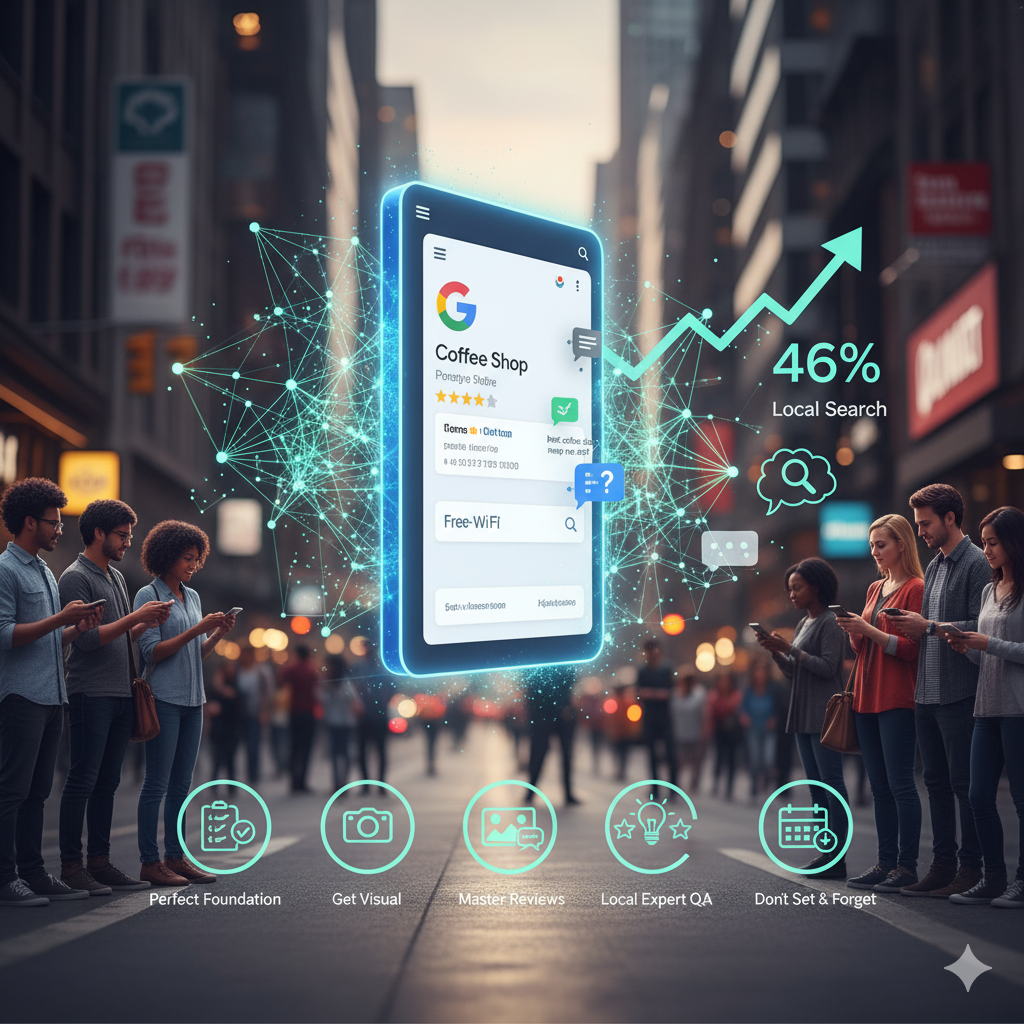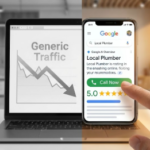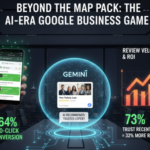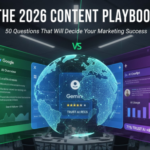“The best place to hide a dead body is page two of Google.”
— Unknown digital marketer, circa 2010.
That used to be true.
Now? The best place to hide your business is in Google’s AI Overview, ChatGPT’s summary, or Bing Copilot’s suggestions — if you’re not mentioned there, you simply don’t exist.
Let’s be honest: we’ve entered an era where your homepage isn’t your front door anymore. The front door is the AI-generated snippet customers see before they ever click a link. And for small businesses, that’s both terrifying and full of opportunity.

The Shift: From Homepage to AI Answer
According to a 2024 study by BrightEdge, over 58% of all Google searches now generate an AI Overview before traditional results even appear (source).
That means customers are making decisions based on summaries, not sites.
AI tools — ChatGPT, Perplexity, Google Gemini, Bing Copilot — all scrape, synthesize, and summarize information from thousands of sources.
If your business isn’t represented in credible data, structured reviews, and consistent listings, you’re invisible to these systems.
Here’s what to do:
- Structure your data. Use schema markup on your site so AI systems can “read” your business hours, reviews, products, and FAQs.
- Be everywhere. AI doesn’t just pull from your website — it reads your Google Business Profile, Yelp, industry directories, and even Reddit threads.
- Publish with purpose. Long-form blogs still matter — but what’s quoted or summarized by AI is what matters most.
Think of AI visibility as “citation SEO.” If your brand isn’t being referenced by credible data sources, you’re out of the game before it starts.
How Review Insights Can Fix Operations, Not Just Improve Ratings
We all know reviews matter. But the smartest small businesses are treating reviews as diagnostic tools, not just reputation boosters.
Here’s what most business owners miss:
- Every review is a free operations report.
- Every rating trend is a pattern in customer experience.
- Every word cloud in your review analytics is a roadmap to retention.
A Harvard Business Review study found that businesses that respond to at least 25% of online reviews see an average revenue increase of 5–9% (source).
But that’s just the surface.
Smart owners now use AI sentiment analysis tools (like Chatmeter, Birdeye, or ReviewTrackers) to:
- Identify repeat complaints (staffing, wait times, product consistency)
- Spot hidden strengths (“friendly staff,” “easy checkout”)
- Track keyword shifts — for example, noticing that customers stopped mentioning “clean bathrooms” after a location change
The real power isn’t fixing your reputation; it’s fixing your business. Reviews tell you where your systems break long before your financial reports do.
What “Good” Looks Like When Clicks Are No Longer the Goal
Clicks are dying.
The click-through rate (CTR) on Google’s first page has dropped by over 13% in the last two years due to AI summaries and zero-click answers (source).
So if clicks aren’t the goal, what is?
Trust. Context. Relevance.
Today, “good” marketing means:
- Your brand appears naturally in AI answers, local packs, and summaries.
- Your content sounds like an expert a customer can trust — not a sales pitch.
- Your reviews, listings, and website say the same thing, consistently.
Instead of asking “how do we get more traffic?”, small businesses should ask:
- How often does AI mention our brand name?
- How consistent is our messaging across Google, social, and reviews?
- Are we helping customers decide, not just click?
That’s the new visibility metric: Decision Inclusion — whether your brand is included in the customer’s decision conversation inside an AI system or not.
How to Compete When Decision Windows Shrink from Days to Minutes
Here’s the reality: the average online decision-making window is now under 30 minutes — down from 2.5 days just five years ago (source).
People aren’t comparing ten websites anymore. They’re trusting AI summaries, scanning one or two reviews, and making a call.
So how can small businesses compete?
1. Own the “Micro-Moment”
Micro-moments are those split seconds when customers search “near me,” “best,” or “open now.”
Be there.
- Keep your Google Business Profile updated daily.
- Use local keywords naturally (“best coffee in Austin,” “family dentist in Tampa”).
- Post weekly — photos, FAQs, offers. Google favors activity.
2. Train for Trust
AI systems prioritize trusted sources.
Build that trust by:
- Getting mentioned by local blogs, Chambers of Commerce, or industry associations.
- Publishing “explainer” content that answers actual customer questions (like this one!).
- Encouraging review authenticity — not perfection. AI now weights diverse, detailed reviews more heavily than perfect scores.
3. Speed Up the Decision Path
If your checkout, booking, or quote process takes more than 60 seconds, you’re losing customers.
Integrate:
- Click-to-call buttons
- One-click booking tools
- Instant chat or SMS replies
You’re not competing for attention anymore. You’re competing for seconds.
Key Takeaways
- AI visibility = credibility. Structure your data and get cited across sources.
- Reviews are business intelligence. Treat them like internal audits, not just PR.
- Clicks don’t equal conversions. Focus on trust and decision inclusion.
- Speed is strategy. Win by being the fastest to respond, not the loudest to advertise.
- Consistency beats complexity. Keep your voice, listings, and messaging unified.
Frequently Asked Questions
1. How do I get my business mentioned in AI answers?
Start by optimizing your Google Business Profile, using schema markup on your site, and getting cited by reputable sources. AI tools pull from structured and verified data first.
2. Are AI summaries replacing SEO completely?
Not yet — but they’re changing it. SEO now includes Answer Optimization: making sure your brand is referenced in AI-generated responses, not just ranked in blue links.
3. What’s the best way to use reviews for operations?
Use sentiment analysis tools to group reviews by topic. Then act: fix the issues that appear most often, and retrain staff around feedback themes.
4. How often should small businesses update content?
At least monthly. Regular updates signal relevance to AI systems and search engines — and customers notice, too.
5. What’s the fastest way to improve online visibility today?
Make sure every data point about your business — name, hours, reviews, services — is accurate across all platforms. That consistency feeds both AI and local SEO.
Written by Linda Donnelly
Founder & Marketing Strategist, Business Solutions Marketing Group
Helping small businesses grow smarter for over a decade.
GBP LInk – https://g.co/kgs/GR8yH4a
LinkedIn – https://www.linkedin.com/company/business-solutions-marketing-group-llc/?viewAsMember=true
Instagram – https://www.instagram.com/business_solutions_mg/
Twitter – https://x.com/BSMGLLC
Facebook – https://www.facebook.com/BusinessSolutionsMarketingGroup
BlueSky: https://bsky.app/profile/bussolutions.bsky.social
TikTok – https://www.tiktok.com/@linda_donnelly
YouTube – https://www.youtube.com/channel/UC4w357-txvxOaHff2hTfSSg






